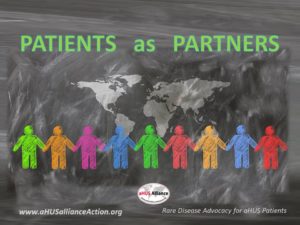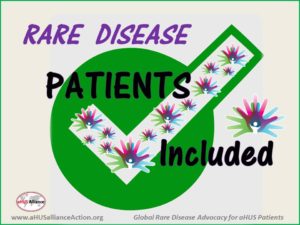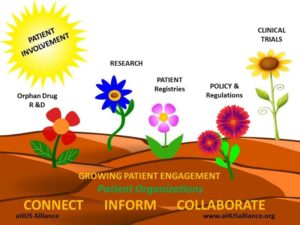
Patients are at the heart of healthcare. Patients are the recipients of medical care, and the participants in research and clinical trials. Patients are decision makers in treatment options, and the key voice in patient compliance issues. Patients are advocates, especially in the rare disease community. What’s the value in viewing patients as partners? What roles can patients play as partners in those arenas where intersection of medicine and research meets with information, industry, healthcare settings, and government or regulatory policy?
There are as many advocacy styles as there are patient voices. Just as patient health histories are unique so are patient interests in advocating for themselves, and for the wider issues and situations that may affect them. Resources are few for most patients challenged by one of the more than 7000 rare diseases, so no doctor’s office stands ready to hand them an information booklet or resource sheet specific to their rare disease. Patients affected by the rare disease atypical HUS, estimated to affect 1 to 2 people per million, are fortunate to have advocacy efforts specific to aHUS with international advocates and patient organizations from many nations associated under the umbrella group of the aHUS Alliance.
Patients share their aHUS journey for a wide variety of reasons to include helping other families gain support, reclaiming their life apart from their medical diagnosis, providing information and insight to others, and various admirable and meaningful reasons. For some, telling their story empowers them while providing some enlightenment to all those listening to that particular rare disease journey. For others sharing their story is a way of sharing support, to help other people living with the same rare disease gain knowledge and hope about meeting challenges with inspired solutions. Partnering with these advocates can help patient organizations galvanize support for healthcare policies and create a grassroots movement to raise awareness of the rare disease and for patient needs. The dedication and compassion of medical staff and researchers is re-confirmed and validated when patient journeys are shared, often providing richer meaning to ‘bench to bedside’ as clinical observations foster research and discovery.
Exploring patient stories are merely the start of patient advocacy and partnerships, skimming only the across the surface of a deep well of patient experiences that have great value. Nothing rings more true than the patient voice on an advisory panel or focus group. If administrators wonder whether their clinical or hospital policy is reality based, partner with patients. When a communications firm weighs whether their new educational materials or online resources tick all the boxes for clear and meaningful outreach to rare disease populations, think to partner with patients. When other industries consider launching a new product, they weigh consumer demand at the outset and carefully create early opportunities for consumer input to help guide their product to market with ideas and information that optimize chances for success. With patients as partners, researchers and pharmaceutical companies can more effectively develop, target, and manage new therapeutics and clinical trials from concept to completion.
Some advocates’ traumatic experiences make them shy away from sharing their rare disease journey, while other people have personalities or professional backgrounds that steer their advocacy toward other avenues. These advocates instead may opt to organize events, promote awareness, post on social media, launch projects, become a legislative activist, serve as patient community leaders, write articles, or act as a ‘citizen scientist’ to gather and share information. Some advocates and organizations lack funding or the opportunites for partnerships, but proactive planning by stakeholders can incorporate patients with forethought so that financial, language, location and other barriers can be lowered to include broad ranges of patient experiences. By informing, connecting, and collaborating with others of shared interests and needs, these individuals by their endeavors have the capacity to become recognized as key opinion leaders (KOLs) within their disease-specific communities. By combing through patient organization websites and social media accounts one can identify the value of having patients as partners by gauging its depth of content, which ideally would reach out to involve, educate, and support a broad and inclusive group of people, organizations, stakeholders, topics, and community needs.
Too little attention is focused on patient concerns such as economic stress, mental health issues, impact on relationships and family, and accommodations which may be needed at school or work. Many companies in the medical or healthcare field employ ‘patient liaison’ staff who listen to and understand patient care needs, assist with navigation through medical services and the insurance system, and help to educate patients and their caregivers about specific health conditions. While patients are partners in care, patient partnerships are sometimes a neglected part of patient engagement. Who defines patient engagement, and how many opportunities exist for patient partnerships that actually engage and involve patients early and often? With patients as partners, people and groups can become aware of how living with a rare disease touches on all areas of life. Patients as partners on advisory committees or focus groups can help industry and regulatory bodies to advance projects and efforts more efficiently and effectively.
Every patient is a person. Every clinical sub-group has specialized needs which merit a holistic approach, to also deserve a place in partnership opportunities. Every person with a rare disease has a story, with patient experiences that can inform and enlighten. Patients as partners can provide unique insights and opinions that can productively speed research or product development along a more efficient path by helping others better target and tailor their efforts. Hard-fought experiences, real life applications, valuable voices – patients as partners.
L Burke
Aug 2017
Patients as Partners: Recent aHUS Multi-national Collaborations
TMA Symposium in Boston – 24 Aug 2017
Orphanet: aHUS Global Registry



